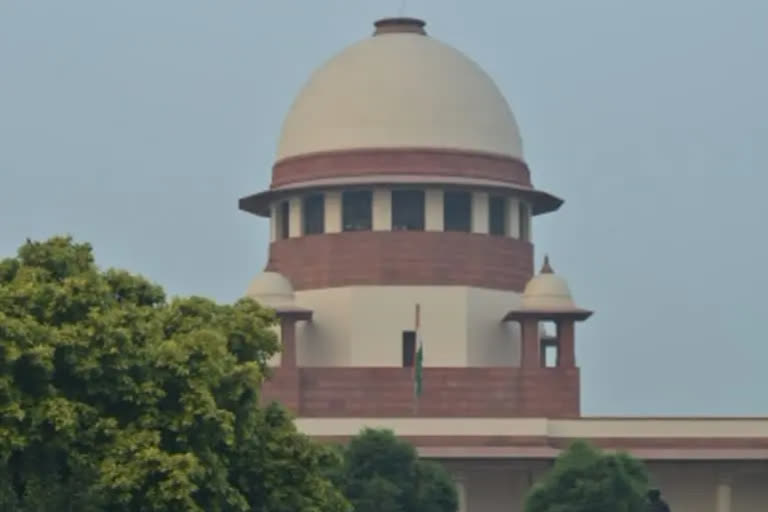New Delhi: The Tamil Nadu government on Tuesday defended in the Supreme Court the law allowing bull-taming sport "jallikattu" in the state, saying it is an "incorrect notion" that an activity, which is in the nature of a sport or entertainment, cannot have a cultural value. "Jallikattu", also known as "eruthazhuvuthal", is a bull-taming sport played in Tamil Nadu as part of the Pongal harvest festival.
In its written submissions filed last month in the apex court, the Tamil Nadu government has said "jallikattu" is a religious and cultural festival that bears a "religious significance" to the people of the state and does not violate the provisions of the Prevention of Cruelty to Animals (PCA) Act, 1960. During the arguments on Tuesday, a five-judge Constitution bench headed by Justice K M Joseph was told by senior advocate Rakesh Dwivedi, appearing for Tamil Nadu, that a sporting event can also be a cultural event and there is no cruelty on the bulls in "jallikattu".
"This is an incorrect notion that an activity, which is in nature of a sport or entertainment or amusement, cannot have a cultural value," he told the bench, also comprising justices Ajay Rastogi, Aniruddha Bose, Hrishikesh Roy and C T Ravikumar. Dwivedi argued that countries like Peru, Columbia and Spain consider bull fighting a part of their cultural heritage.
"Let us not forget that bulls are facing much more cruel world today. Why I say that? Tractors have come in, harvesting machines have come in. Transport vehicles are there. What do these bulls do? Where do they go?" he argued. He said bulk of the meat which is exported from India is not from the South. "Are we pushing these bulls to save them from this small suffering and pain to the slaugher house is the question which I am posing. Let's not forget this and if the legislature wants to avoid that, can it be said to be manifestly arbitrary etc," Dwivedi argued.
He said bulls involved in "jallikattu" are maintained by farmers round the year. "This cannot be overlooked at all, which is completely lost sight of. We are overemphasising the pain etc," he said, adding, "Let them live their lives at least." The apex court is hearing arguments on a batch of petitions against the Tamil Nadu and Maharashtra laws allowing "jallikattu" and bullock-cart races.
The top court had, in its 2014 judgment, said bulls cannot be used as performing animals either for "jallikattu" events or bullock-cart races, and banned their use for these purposes across the country. It had earlier dismissed the Tamil Nadu government's plea seeking a review of its 2014 judgment banning the use of bulls for "jallikattu" in the state and bullock-cart races across India.
Tamil Nadu had amended the central law -- The Prevention of Cruelty to Animals Act, 1960 -- and allowed "jallikattu" in the southern state. Some of the petitioners had argued before the apex court that when the law prohibits cruelty to animals there cannot be an amending Act which perpetuates cruelty. During the day-long hearing on Tuesday, Solicitor General Tushar Mehta, appearing for the Centre as well as the Maharashtra government, told the bench that he "fully supports" the legislations of Maharashtra and Tamil Nadu.
He said in Tamil Nadu, this tradition dates back to thousands of years and it is nobody's case that it is not a part of the culture and customs. Mehta said in Maharashtra, he must make one thing clear that the impression, possibly on the petitioner side, is that any bull is picked up and the animal takes part in either "jallikattu" or in the race.
He said, like in horse races, where any horse does not participate in the derby, there is a special breed which is trained for the sport. On the issue of presidential assent to these laws, Mehta said he has come with the original files and would submit them for the perusal of the court. "Grant of assent is not in question," he said, adding, "Files are here. I will submit it for your lordships' perusal."
"My only worry is this may not become a precedent that in every case, the files, which are ultimately signed by the President, are called for and are subjected to scrutiny. But your lordships can definitely look into it," the solicitor general said. Senior advocate Mukul Rohatgi also advanced arguments on behalf of Tamil Nadu in the matter.
In its written submission filed in the apex court last month, the Tamil Nadu government said "jallikattu" is not merely an act of entertainment or amusement but an event with great historic, cultural and religious value. "Jallikattu not only preserves the cultural and traditional heritage, the cause of conservation of a native breed of cattle is also addressed by the continuous conduct of these events," it has said.
The apex court is considering five questions referred to it by a two-judge bench of the top court in February 2018. Referring the issue to the five-judge bench, the apex court had said the petitions challenging the Prevention of Cruelty to Animals (Tamil Nadu Amendment) Act, 2017 need to be decided by a larger bench since those involve substantial questions related to the interpretation of the Constitution. (PTI)
(This story has not been edited by ETV Bharat and is auto-generated from a syndicated feed.)



